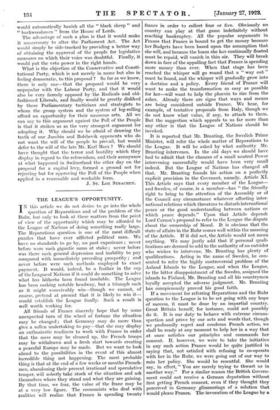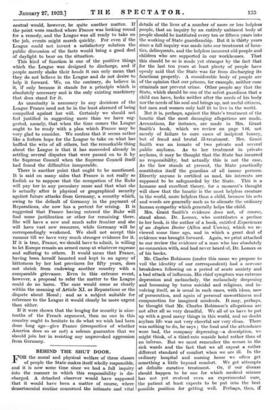THE LEAGUE'S OPPORTUNITY.
IN this article we do not desire to go into the whole question of Reparations and of the problem of the Ruhr, but only to look at these matters from the point of view of the opportunity which may be afforded to the League of Nations of doing something really large. The Reparations question is one of the most difficult puzzles that have ever afflicted political man. We have no standards to go by, no past experience ; never before were such gigantic sums at stake ; never before was there such general depression and inability to pay compared with immediately preceding prosperity ; and never before were such methods employed to exact payment. It would, indeed, be a feather in the cap of the League of Nations if it could do something to solve what has hitherto been found insoluble. The League has been making notable headway, but a triumph such as it might conceivably win—though we cannot, of course, pretend at present that it is likely to win it— would establish the League finally. Such a result is well worth working for.
All friends of France sincerely hope that by some unexpected turn of the wheel of fortune the situation may be changed ; that Germany may do more than give a sullen undertaking to pay—that she may display an enthusiastic readiness to work with France in order that the mess may be cleaned up, the French troops may be withdrawn and a fresh start towards creating a peaceful Europe may be made. But we want to look ahead to the possibilities in the event of this almost incredible thing not happening. The most probable thing is that at the end of a few weeks or months French- men, abandoning their present irrational and speculative temper, will soberly take stock of the situation and ask themselves where they stand and what they are gaining. By that time, we fear, the value of the franc may be at a very low figure. The economists who deal with Xealities will realize that France is spending twenty francs in order to collect four or five. Obviously no country can play at that game indefinitely without reaching bankruptcy. All the popular arguments in France that France is bound to get the money because her Budgets have been based upon the assumption that she will, and because the loans she has continually floated must be repaid, will vanish in thin air. They will break down in face of the appalling fact that France is spending more money than ever. When that stage has been reached the whisper will go round that a " way out " must be.found, and the whisper will gradually grow into a doctrine and a policy. Every friend of France will want to make the transformation as easy as possible for her—will want to help the phoenix to rise from the ashes. Already there are signs that ways and means are being considered outside France. We hear, for example, of tentative proposals from Italy, though we do not know what value, if any, to attach to them. But the suggestion which appeals to us far more than any other is that the League of Nations should be invoked.
It is reported that Mr. Branting, the Swedish Prime Minister, will refer the whole matter of Reparations to the League. It will be asked by what authority Mr. Branting intervenes. In the old days we should have had to admit that the chances of a small neutral Power intervening successfully would have been very small indeed. But the League of Nations has changed all that. Mr. Branting founds his action on a perfectly explicit provision in the Covenant, namely, Article XL This Article says that every member of the League— and Sweden, of course, is a member—has " the friendly right to bring to the attention of the Assembly or of the Council any circumstance whatever affecting inter- national relations which threatens to disturb international peace or the good understanding between nations on which peace depends." Upon that Article depends Lord Curzon's proposal to refer to the League the dispute about the ownership of Mosul. It is obvious that the state of affairs in the Ruhr comes well within the meaning of the Article. If it did not, the Article would not mean anything. We may justly add that if personal quali- fications are deemed to add to the authority of an outsider who wishes to intervene, Mr. Branting has plenty of qualifications. Acting in the name of Sweden, he con- sented to refer the highly controversial problem of the Aaland Islands to the League, and when the League, to the bitter disappointment of the Swedes, assigned the islands to Finland, Mr. Branting and all his countrymen loyally accepted the adverse judgment. Mr. Branting has conspicuously proved his good faith.
If a movement for referring Reparations and the Ruhr question to the League is to be set going with any hope of success, it must be done by an impartial country. Great Britain herself, for instance, could not possibly do it. It is our duty to behave with extreme circum- spection and prbve by our acts and words that, though we profoundly regret and condemn French action, we shall be ready at any moment to help her in a way that at once satisfies our principles and commands her consent. If, however, we were to take the initiative in any such action France would be quite justified in saying that, not satisfied with refusing to co-operate with her in the Ruhr, we were going out of our way to ruin her policy. She would be resentful. She would say, in effect, " You are merely trying to thwart us in another way." For a similar reason the British Govern- ment could not receive a German deputation without first getting French consent, even if they thought they perceived in Germany glimmerings of a solution that would please France. The invocation of the League by a neutral would, however, be quite another matter. If - the point were reached where France was looking round for a remedy, and the League was all ready to take on "the job, events might march quickly. For even if the League could not invent a satisfactory solution the public discussion of the facts would bring a good deal - of daylight to bear on the situation. - This kind of function is one of the positive things which the League was designed to discharge, and if people merely shake their heads it can only mean that they do not believe in the League and do not desire to help it forward. We, on the contrary, do believe in it, if only because it stands for a principle which is absolutely necessary and is the only existing machinery that does stand for it.
As unanimity is necessary in any decisions of the League France need not be in the least alarmed of being compelled against her will. Certainly we should not feel justified in suggesting more than we have sug- gested, namely, that when the time comes the League ought to be ready with a plan which France may be very glad to consider. We confess that it seems rather like a forlorn hope for the League to take on what has baffled the wits of all others, but the remarkable thing about the League is that it has succeeded already in settling several disputes that were passed on to it by the Supreme Council when the Supreme Council itself had found the difficulties insuperable.
There is another point that ought to be mentioned. It is said on many sides that France is not really so foolish as to suppose that the occupation of the Ruhr will pay her in any pecuniary sense and that what she is actually after is physical or geographical security against future attacks from Germany, a security which, owing to the default of Germany in the payment of Reparations, she now has a pretext for seizing. It is suggested that France having entered the Ruhr will find some justification or other for remaining there. She will have a new and much safer frontier and she will have vast new resources, while Germany will be correspondingly weakened. We shall not accept this rumour till we have very much stronger evidence for it. If it is true, France, we should have to admit, is willing to let Europe remain an armed camp at whatever expense and suffering to others. It would mean that France, having been herself haunted and kept in an agony of bitterness by her lost provinces for fifty years, does not shrink from endowing another country with a comparable grievance. Even in this extreme event, however, a proposal to refer the matter to the League could do no harm. The case would come as clearly within the meaning of Article XI. as Reparations or the -dispute about Mosul ; and as a subject suitable for .reference to the League it would clearly be more urgent than either.
If it were shown that the longing for security is nine- tenths of the French argument, then no one in this country ought to hesitate to do what we wish had been done long ago—give France (irrespective of whether America does so or not) a solemn guarantee that we should join her in resisting any unprovoked aggression _from Germany.











































 Previous page
Previous page